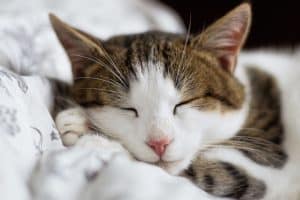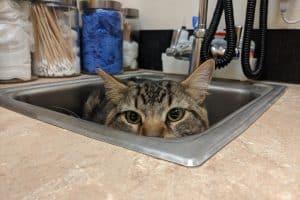Cats seem to have nine lives compared to dogs, living longer on average. But why is that the case?
Cats’ longevity compared to dogs is influenced by various factors such as genetics, diet, lifestyle, and healthcare. Let’s explore the reasons behind why cats live longer than dogs.
Genetics: The Role of Breed Differences
When it comes to genetics and lifespan, different breeds of cats and dogs have varying predispositions. Cats generally have fewer breed-related health issues compared to dogs, which can contribute to their longer lifespan. For example, certain dog breeds are prone to specific genetic health problems that can shorten their lifespan, such as hip dysplasia in large breeds like Great Danes and heart conditions in Cavalier King Charles Spaniels. On the other hand, cats have a wider gene pool, leading to fewer breed-specific health concerns that can impact their longevity.
Additionally, the size of the animal plays a role in their lifespan. Smaller dogs tend to have longer lifespans compared to larger breeds due to various genetic factors. Cats, being generally smaller animals, may benefit from this trait, resulting in an extended lifespan overall. This is not to say that all large dogs will have shorter lives than cats, but size can be a contributing factor when it comes to genetic predispositions and overall health.
Diet and Nutrition: Impact on Longevity
When it comes to the diet and nutrition of cats and dogs, there are key differences that can influence their lifespan. Cats are obligate carnivores, meaning their diet must consist mainly of animal protein to thrive. This natural diet, low in carbohydrates and rich in high-quality protein, is essential for their overall health and wellbeing.
On the other hand, dogs are more omnivorous, able to derive nutrients from both plant and animal sources. However, the quality of their diet can greatly impact their lifespan. Opting for high-quality, balanced dog food that meets their nutritional needs can contribute to a longer and healthier life.
An additional unique insight to consider is the impact of hydration on longevity. Cats have a lower thirst drive compared to dogs, which can sometimes lead to inadequate water intake. Ensuring your cat has access to fresh, clean water at all times can help support their overall health and potentially contribute to a longer lifespan.
Remember, providing your furry friend with a balanced diet tailored to their specific needs can make a significant difference in their quality and length of life.
Lifestyle Factors: Exercise and Stress Management
Let’s talk about why cats seem to have more lives than dogs. One key factor is their lifestyle choices. Cats tend to be more independent and are experts in conserving energy. This means they may not require as much exercise as dogs. However, regular playtime and interactive toys are essential to keep your feline friend active and healthy. On the other hand, dogs thrive on daily walks and runs to stay fit and mentally stimulated. So, ensuring your furry friend gets enough exercise tailored to their needs is crucial for their longevity.
When it comes to stress management, cats have a knack for finding cozy spots to relax and unwind. They are masters of the art of chilling out. Dogs, on the other hand, may experience stress from various sources like loud noises, changes in routine, or separation anxiety. Providing a safe and comfortable environment, along with plenty of mental stimulation, can help your canine companion cope with stress and lead a longer, happier life.
In summary, understanding the exercise and stress management needs of your pets is key to promoting their longevity. By incorporating regular play and relaxation practices into their daily routines, you can help your furry friends live their best lives.
Healthcare: Regular Check-ups and Preventative Care
When it comes to the health and well-being of our pets, proactive measures play a vital role in extending their lifespan. Just like humans, cats and dogs benefit greatly from regular veterinary check-ups. These check-ups help detect any potential health issues early on, allowing for timely intervention and treatment. Preventative care such as vaccinations, parasite control, and dental hygiene is also crucial in maintaining your pet’s overall health.
For cats specifically, regular check-ups can catch common ailments like dental disease, kidney issues, or thyroid problems before they escalate. On the other hand, dogs may be prone to conditions such as arthritis, heart disease, or obesity, which can be managed effectively with early detection and proper care.
In addition to check-ups, providing your pets with a balanced diet, regular exercise, and a safe environment are essential components of preventative care. Remember, investing in your pet’s health today can lead to a longer and healthier life for them tomorrow.
Additional Tip : To ensure your furry friends receive the best care possible, consider investing in pet insurance. This can help cover unexpected medical expenses and ensure your pets receive the care they need without financial strain.
Environmental Factors: Indoor vs. Outdoor Living
When it comes to the lifespan of our furry friends, environmental factors play a significant role. Cats are known to live longer than dogs, and one reason for this is their preference for indoor living. Indoor cats are shielded from dangers like traffic accidents, predators, and diseases that outdoor cats may face. On the other hand, dogs often spend more time outdoors, increasing their exposure to these risks. By keeping your pets indoors, especially cats, you can help them live longer, healthier lives.
Interesting Fact: Myth Busting about Cats’ Nine Lives
Did you know that the belief that cats have nine lives is just a myth? While cats are indeed known for their agility and survival instincts, they only have one life just like any other animal. The origin of this myth is uncertain, but it’s clear that cats are not invincible. So, next time your feline friend gets into a sticky situation, remember they rely on their wit and skill, not multiple lives, to navigate risky scenarios. Keep your curious cat safe and sound to ensure they enjoy their one precious life to the fullest.
Expert Insight: Veterinarian’s Perspective on Feline Longevity
Cats have a reputation for having nine lives, but there’s more to their longevity than just luck. Veterinarians point to a few key factors that contribute to cats outliving dogs. One major reason is their lower susceptibility to certain genetic diseases compared to dogs. In addition, cats are generally more self-sufficient creatures, often requiring less intensive care than dogs. This independence can translate to a longer lifespan, as cats are skilled at taking care of themselves. However, regular check-ups, vaccinations, and a balanced diet are still essential for ensuring a cat’s longevity. So, be sure to schedule those vet visits!
Holistic Approaches: Natural Remedies and Alternative Therapies
When it comes to supporting your cat’s longevity, holistic approaches can complement traditional veterinary care. Natural remedies such as omega-3 fatty acids can support overall health, including joint function and cognitive function. Additionally, alternative therapies like acupuncture and massage can help manage chronic pain and improve mobility in older cats. Remember, holistic care should always be used in conjunction with veterinarian-approved treatments. It’s about finding the right balance for your feline friend. Consider incorporating these natural remedies and alternative therapies into your cat’s wellness routine to promote their longevity.
- Dietary Supplements: Consider adding supplements like probiotics to support your cat’s digestive health.
- Herbal Remedies: Look into herbs like chamomile or valerian root to help calm anxious cats.
- Environmental Enrichment: Providing mental stimulation through interactive toys and puzzle feeders can keep your cat sharp as they age.
- Regular Exercise: Engage your cat in playtime to maintain their muscle tone and overall fitness.
- Quality Sleep: Ensure your cat has a cozy, comfortable sleeping area to promote restful sleep and overall well-being.
Remember, always consult with a veterinarian before introducing any new treatments or therapies. By taking a holistic approach to your cat’s care, you can help them live a longer, happier life.
Human-Animal Bond: Emotional Connection and Well-being
Cats’ longer lifespan compared to dogs can be attributed in part to the unique nature of the human-cat bond. Studies have shown that the emotional connection between humans and cats can have a positive impact on overall well-being. The relaxing presence of cats can help reduce stress levels and lower blood pressure, which in turn may contribute to a longer, healthier life for their human companions.
Additionally, cats are known to be more independent than dogs, which can lead to less stress and anxiety in pet owners. This reduced stress may also play a role in increasing the lifespan of cat owners compared to dog owners. Cats’ ability to provide companionship without demanding constant attention can create a more relaxed and harmonious living environment, benefiting both the cat and their human family.
Furthermore, the calming effect of a cat’s purring has been linked to lower levels of anxiety and improved emotional well-being. This soothing sound can help reduce stress and promote relaxation, contributing to a healthier lifestyle for cat owners. Ultimately, the strong emotional bond between cats and their owners may be a key factor in why cats tend to live longer than dogs.
Unique Insight:
One specific way in which the human-cat bond may contribute to cats living longer than dogs is through the positive impact that cat companionship can have on mental health. Studies have shown that owning a cat can reduce feelings of loneliness and depression, which in turn may lead to better overall health and a longer lifespan.
Additional Tips for Enhancing the Human-Animal Bond:
- Spend quality time with your cat each day to strengthen your bond and improve overall well-being.
- Provide enrichment for your cat through toys, scratching posts, and interactive play to keep them mentally stimulated and engaged.
- Regular veterinary check-ups can help ensure your cat’s health and longevity, so make sure to schedule routine appointments with your vet.
Alex, a passionate animal lover, has experience in training and understanding animal behavior. As a proud pet parent to two dogs and three cats, he founded AnimalReport.net to share insights from animal experts and expand his knowledge of the animal kingdom.









